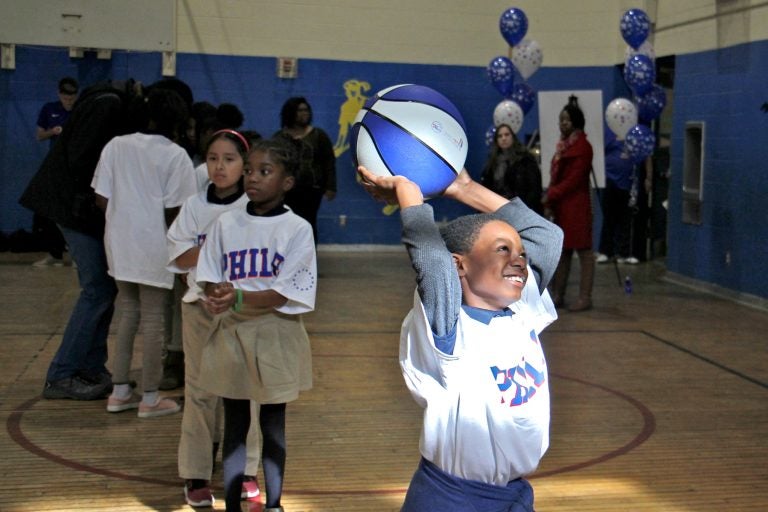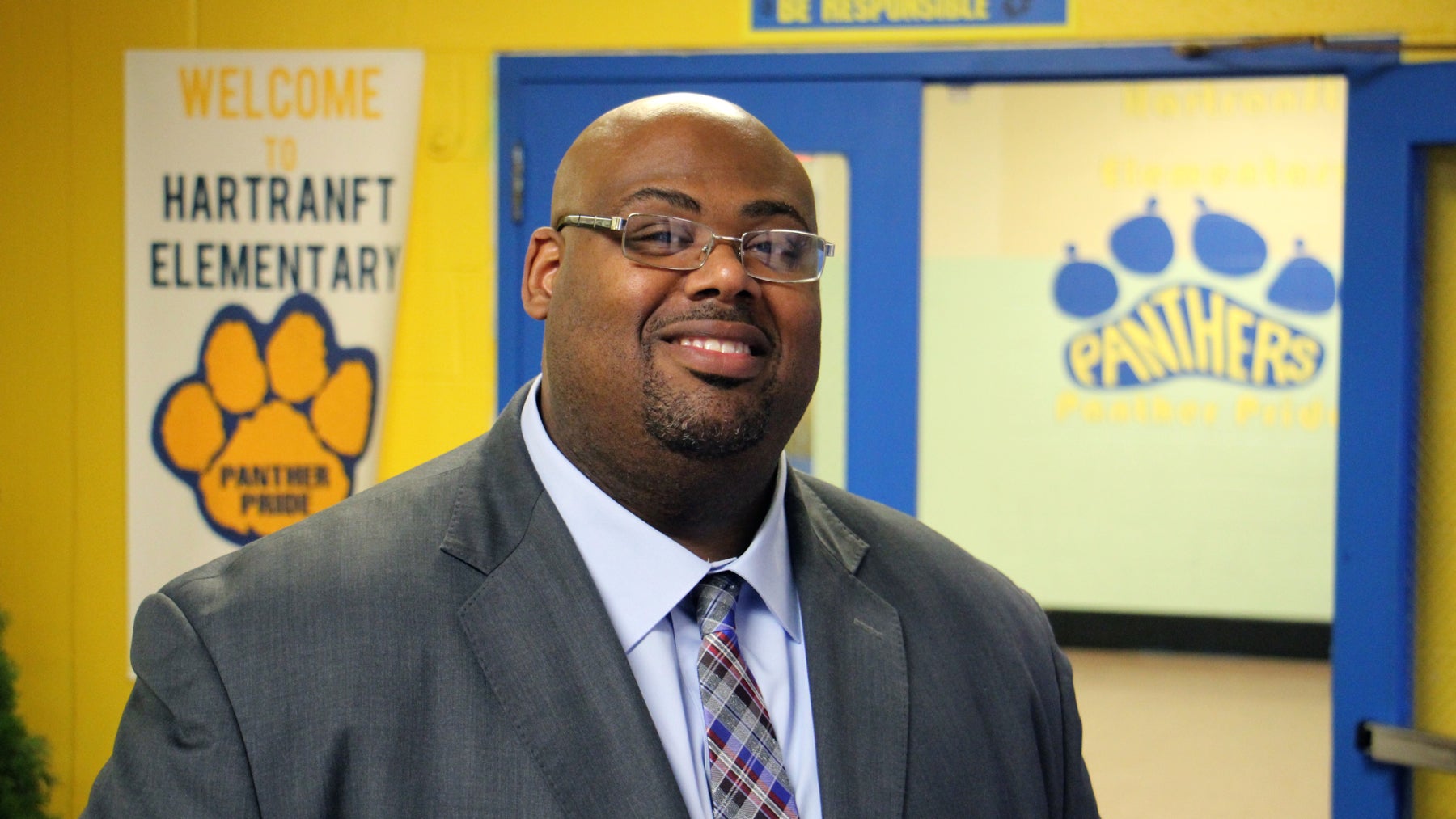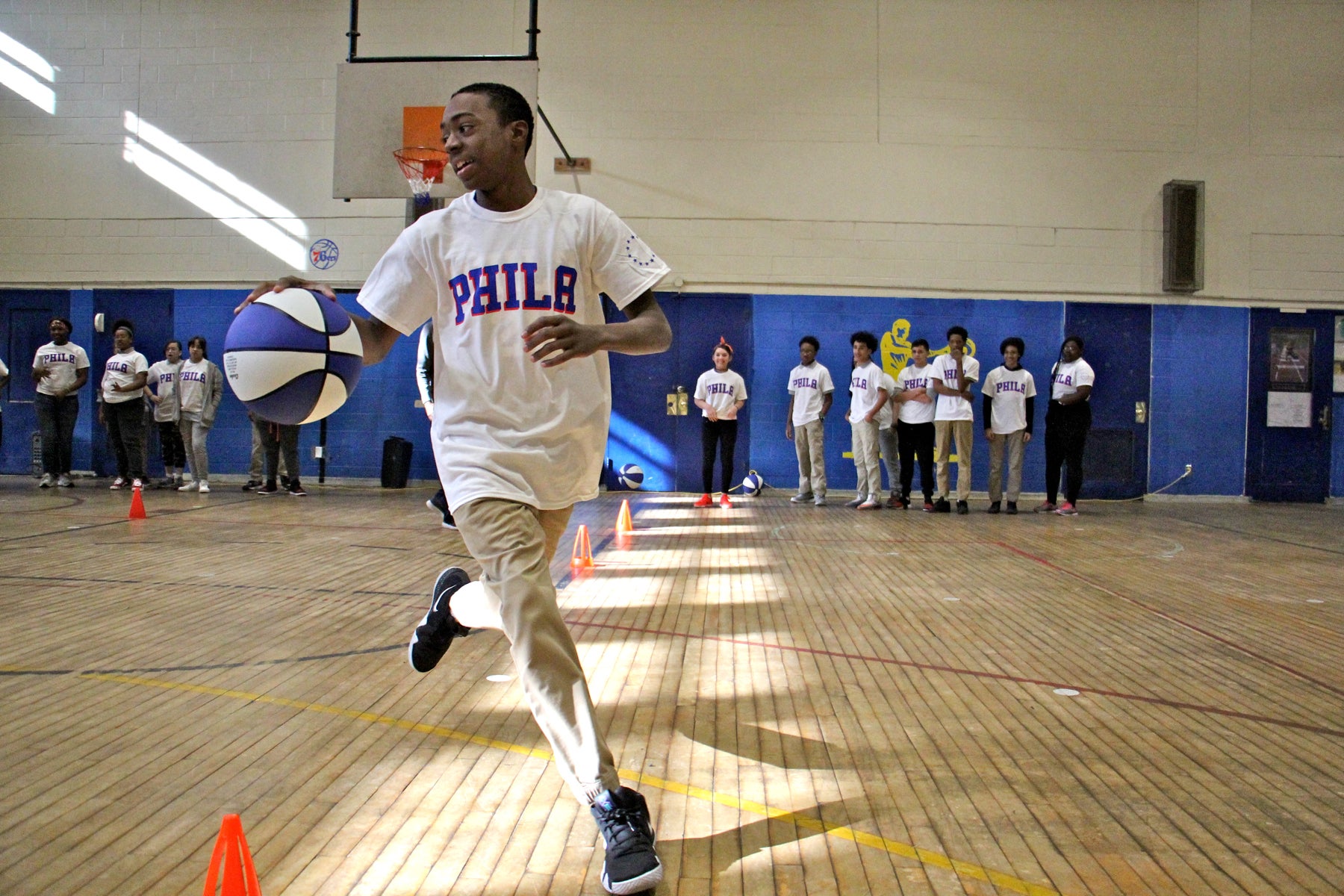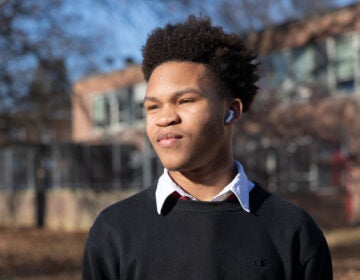Sixers join push to accentuate the positive at Philly school
Hartranft students are taught to be safe, responsible, and respectful. If a teacher “catches” a student embodying one of those characteristics, he or she is rewarded.

Hartranft fourth-grader Terrsir Smith enjoys a basketball clinic put on by the Philadelphia 76ers at his school, a reward for positive behavior. (Emma Lee/WHYY)
At John Hartranft School in North Philadelphia, staff stay vigilant.
Teachers and administrators at the K-8 school aren’t on the lookout for transgressions. Instead, they’re trying to catch students in the act of doing something right.
“We catch the students and recognize them at every chance we get for doing something positive and productive,” said fourth-year principal Jason Lytle.
Hartranft’s approach to school management is called PBIS — or positive behavioral intervention and supports — and it’s among a growing set of Philly schools to embrace the strategy.
In practice, PBIS is like a painstakingly structured reward system, where the traditional mode of discipline and boundary setting is flipped on its head.
Hartranft students are taught, repeatedly, how to be safe, responsible, and respectful. If a teacher “catches” a student embodying one of those characteristics, he or she gives that student a token that can be exchanged later for a reward in an internal school economy. Even teachers can earn plaudits that lead to payoffs.
The underlying theory is that good behavior must be taught and positively reinforced. Ideally, said Jody Greenblatt, the district’s deputy chief for school climate and safety, students, and teachers hear praise six times more often than they hear negativity.
“Behavior science shows you don’t take away, you just give,” said Greenblatt.
Hartranft was among the first district schools to adopt PBIS when it first switched to the model in 2012-13. Today, 50 elementary and middle schools have implemented PBIS as part the district’s gradual growth plan. Grants from the U.S. Department of Justice have helped fund implementation efforts in Philly and elsewhere (perhaps to the exclusion of other, research-based approaches).
District officials consider Hartranft one of their PBIS success stories.
The school’s SPR — a district measure of school quality — has improved from 13 percent in 2013-14 to 34 percent in 2015-16. Based on preliminary data, school leaders expect another bump when the 2016-17 scores are released in the coming weeks.
The percentage of students earning suspensions is down. The percentage of students attending school regularly is up.

Lytle traces much of the change back to PBIS. Academics, he believes, can’t improve without the foundation a good school climate provides.
“It’s climate and academics working as one into a single school culture,” Lytle said.
Every PBIS school has its own reward system. Hartranft doles out Panther Paws that can be cashed in at the school store — cleverly named Paw Mart — for toys. Older students earn pizza parties, dress-down days and other experiences.
Recently one class earned a trip to a Philadelphia 76ers game where they met Sixers legend Allen Iverson.
The Sixers also held a basketball clinic at the school Friday, and the team has been a consistent partner with the school, providing plenty of potential rewards along the way.
The team set Hartranft up with its own PBIS-inspired rubric called SCORE, which uses similar concepts to reinforce healthy eating and exercise. Kids who drink water and sleep right can potentially earn gear, autographs, and Sixers-themed parties.

With each year, said Lytle, Hartranft’s PBIS approach grows more ambitious. At first, the school used it primarily to enforce basic behaviors such as standing in line or walking in the hallways.
Teachers would mechanically praise students for adhering to these rules because PBIS encourages staff to identify what students are doing well.
“A lot of times teachers think they’re giving praise by saying ‘good job’,” said Greenblatt with the district. “Actually, it’s behavior-specific praise you need to give in order to change behavior.”
Now that those baseline behaviors have become commonplace, Hartranft is looking to reward academic behaviors such as staying on task, engaging, or improving on benchmark tests. With the addition of SCORE, personal health has become part of Hartranft’s PBIS approach.
Students have even started to police themselves, said Lytle.
As fourth-grader Terrsir Smith explained: “If someone gets smart to you, just calm down and cheer them up.”
WHYY is your source for fact-based, in-depth journalism and information. As a nonprofit organization, we rely on financial support from readers like you. Please give today.





